The Incoterms are a set of commercial/trade rules established by the International Chamber of Commerce (“ICC”) that are used in international sale contracts.[1] The Incoterms are not mandatory rules – for them to receive legal effect, they must be explicitly incorporated by the parties into their contract. In the following paragraphs, after outlining the classification of Incoterms, we will describe basic features of Incoterms used for all modes of transport, as well as of those used only for sea and inland waterway transport. We will also describe changes in the Incoterms 2020 rules.
Classification of Incoterms
The Incoterms are divided into four principal categories: E, F, C and D.
Category E (Departure), which contains only one trade term, i.e. EXW (Ex Works).
Category F (Main Carriage Unpaid), which contains three trade terms:
- FCA (Free Carrier)
- FAS (Free Alongside Ship)
- FOB (Free on Board)
Category C (Main Carriage Paid), which contains four trade terms:
- CPT (Carriage paid to)
- CIP (Carriage and Insurance paid to)
- CFR (Cost and Freight)
- CIF (Cost, Insurance and Freight)
Category D (Arrival), which contains three trade terms:
- DAP (Delivered at Place)
- DPU (Delivered at Place Unloaded)
- DDP (Delivered Duty Paid)
The four above-mentioned categories can also be classified as per the means of transportation:
- Incoterms for any mode of transport: EXW, FCA, CPT, CIP, DPU, DAP and DDP;
- Incoterms only for sea and inland waterway transport: FAS, FOB, CFR and CIF.
Each Incoterm contains a set of rules of interpretation for the obligations of both the seller (A1-A10) and the buyer (B1-B10) covering the following issues:
- A1/B1 – General Obligations,
- A2/B2 – Delivery,
- A3/B3 – Transfer of risks,
- A4/B4 – Carriage,
- A5/B5 – Insurance,
- A6/B6 – Delivery/transport document,
- A7/B7 – Export/import clearance,
- A8/B8 – Checking/packaging/marking,
- A9/B9 – Allocation of costs, and
- A10/B10 – Notices.
Basic Features of Incoterms Used for All Modes of Transport
EXW Incoterm (Ex Works)
The EXW Incoterm imposes only minimum obligations on the seller. More particularly, the seller is simply required to deliver the goods to the buyer at a named place of delivery which is usually the seller’s place of business, but can be any particular location such as a warehouse, factory, etc., and within the agreed time specified in the contract.[2] It is not required for the seller to load the goods on any specific vehicle or to clear the goods for export. If the place of delivery is not specified in the contract, or if several place of delivery can be envisaged, “the seller may select the point that best suits its purpose.”[3] In principle, until the goods have not been delivered as specified in the sale contract, the seller bears all risks of loss or damage to the goods. Once delivered, such risk is automatically shifted to the buyer. The same is true for any costs relating to the goods – until the delivery of the goods, the costs are to be borne by the seller; after their delivery, by the buyer.
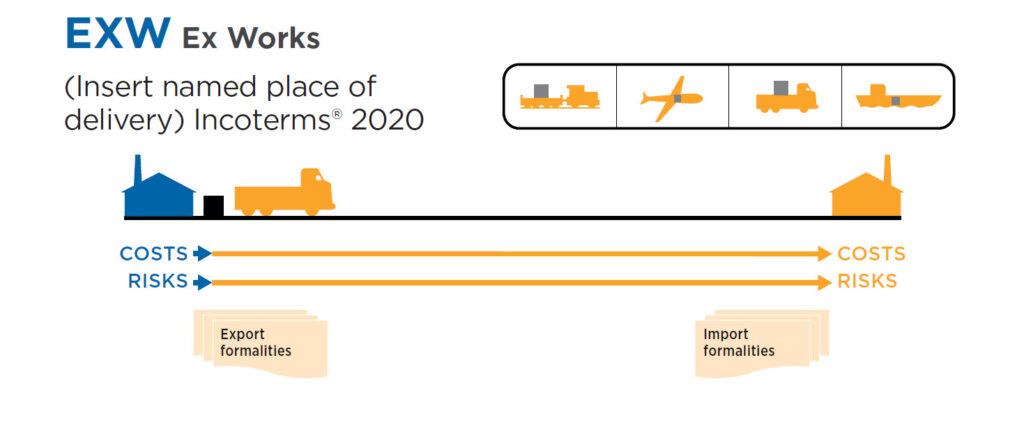
Several authors suggest that the EXW Incoterm is better suited for domestic (and not international) trade[4] and point out that it is “commonly used in courier shipments when the courier picks up the shipment from client’s premises and loads courier’s own truck. Payment terms for EXW transactions are generally cash in advance and open account.”[5]
As mentioned in the ICC Guide to Incoterms 2010, parties sometimes insert a term “loaded” following the reference to EXW Incoterm, i.e., EXW loaded, into their sales contract. Such an addition is normally intended to extend responsibility to loading operations. However, without further clarification, it is rather difficult to say whether such a term means “loaded at seller’s risk” or “loaded at buyer’s risk”[6] and is subject to interpretation in case of dispute. In this respect, if “loaded” is meant to extend the liability to the seller, the parties may consider inserting the FCA Incoterm (see below), and not EXW, into their contract. However, they should bear in mind that the FCA Incoterm requires that the obligation to clear the goods for export be borne by the seller as well. [7]
FCA Incoterm (Free Carrier)
Under the FCA Incoterm, the delivery of goods occurs as follows:
- When the named place of delivery is the seller’s premises, the goods are deemed to be delivered when they are loaded on the transportation vehicle arranged by the buyer;
- When the named place of delivery is elsewhere, e.g., a warehouse or factory, etc., the goods are deemed to be delivered when the following requirements are met: after having been loaded on the seller’s transportation vehicle, they reach the named place, are ready for unloading from the seller’s transportation vehicle and are placed at the disposal of the carrier nominated by the buyer.[8]
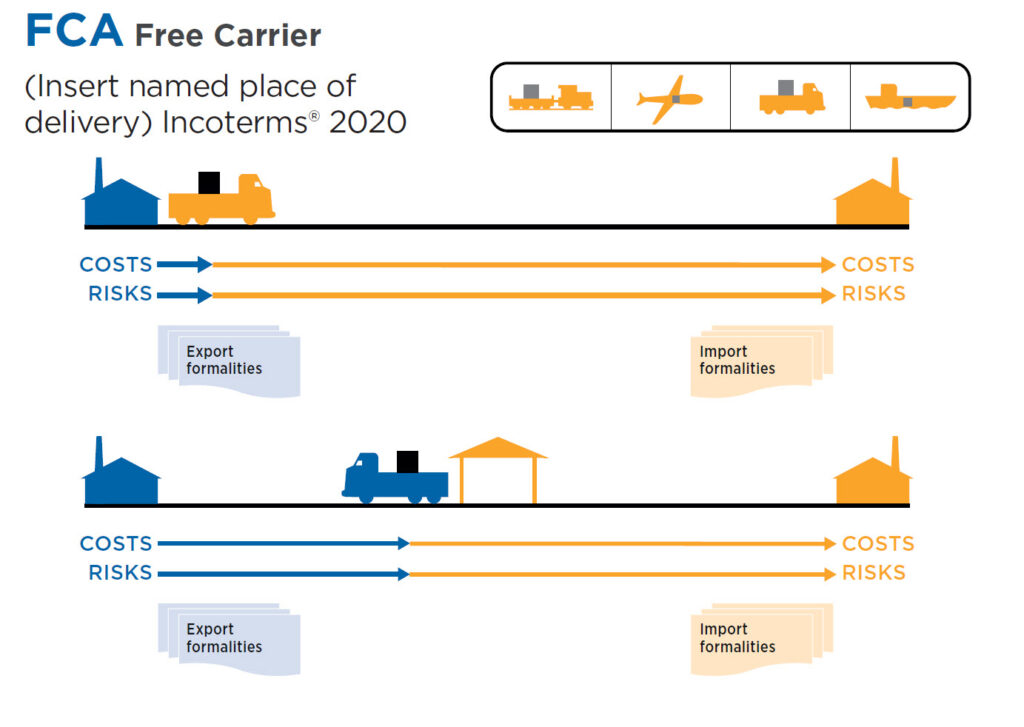
Regarding the carrier, it is usually “a firm that itself transports goods or passengers for hire, rather than simply arranging for such transport. Examples are a shipping line, airline trucking firm, or railway. In the FCA term, however, the carrier can by any person who by contract ‘undertakes to perform or procure’ such services”.[9]
In 2020, several new obligations were added to the FCA Incoterm. For example, the parties may agree that the buyer instructs the carrier to issue the transport document (bill of landing) with the on-board notation to the seller. In turn, the seller undertakes to send this document to the buyer, “who will need the bill of landing in order to obtain discharge of the goods from the carrier.”[10]
The FCA Incoterm further requires the seller to clear the goods for export, where applicable. However, the seller has no obligation to clear the goods for import. No insurance obligation is placed either on the seller or the buyer.
CPT Incoterm (Carriage Paid to)
Under the CPT Incoterm, the delivery of the goods occurs when they are delivered by the seller to the carrier at the agreed place or are procured by the seller so delivered. In this respect, the seller has an obligation to contract, at its expense, for the carriage of the goods from the point of delivery to the place of destination of the goods. The existence of the contract of carriage has no impact on the transfer of risk from the seller to the buyer which occurs at the point of delivery, i.e., by handing over the goods to the carrier.[11] However, if the seller incurs costs relating to unloading of goods at the place of destination under the contract of carriage, it must bear them, unless otherwise agreed.
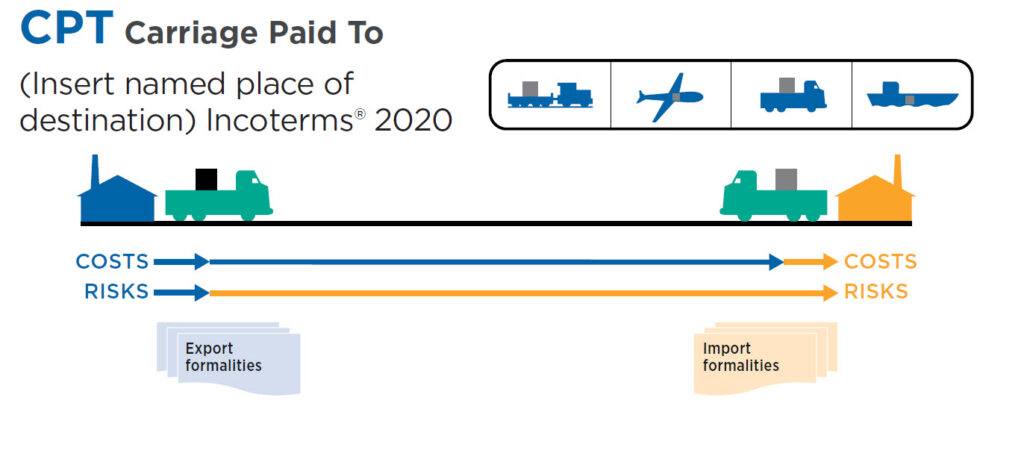
The CPT Incoterm also requires that the seller clear the goods for export, where applicable, and assume all risk related thereto. However, the seller has no such obligation for import. Neither the seller, nor the buyer, is required to conclude an insurance contract.
CIP Incoterm (Carriage and Insurance Paid to)
Under the CIP Incoterm, the seller has the same obligations as under the CPT Incoterm, i.e., to hand over the goods to the carrier contracted by the seller and to clear the goods for export,[12] with the addition of an obligation to contract for insurance in order to cover against the buyer’s risk/damage to the goods from the place of delivery to, at least, the place of destination.
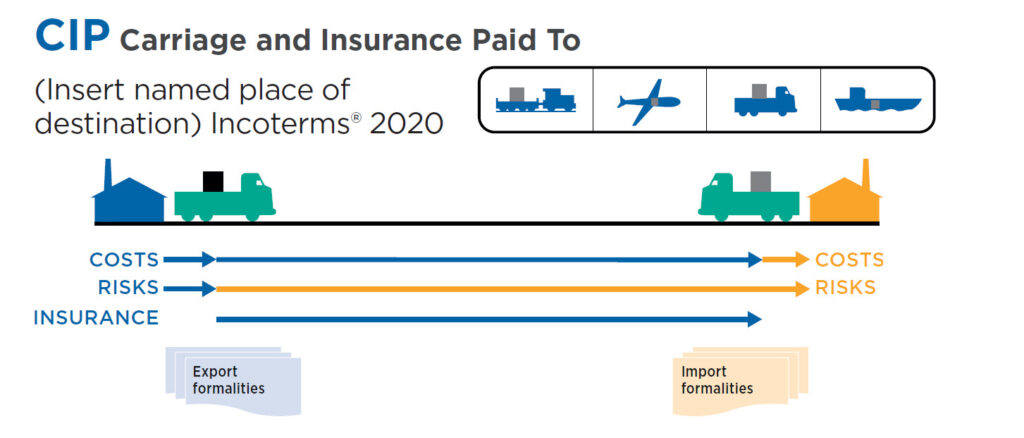
Regarding insurance, it shall be made in conformity with Clauses (A) of the Institute Cargo Clauses, or similar clauses, and shall cover, at a minimum, the contractual price plus 10%. Prior to the 2020 revision of the Incoterms, only a minimum insurance coverage pursuant to Clauses (C) of the Institute Cargo Clauses was required.[13] However, even today, the parties can agree on a lower coverage.[14] Once contracted, the seller has an obligation to provide the insurance policy or certificate to the buyer.
DAP Incoterm (Delivered at Place)
This Incoterm is normally used in cases when the parties do not wish that the seller bear the risk and cost of unloading, contrary to the DPU Incoterm (see below). Under the DAP Incoterm, the goods are deemed delivered by the seller to the buyer when they are put at the disposal of the buyer on the transportation vehicle ready for unloading at the place of destination or an agreed point within such place, if any.[15] Contrary to the CPT/CIP Incoterms, the place of delivery and the place of destination are the same under the DAP Incoterm. Therefore, the seller bears the risk until it has put the goods at the disposal of the buyer at the place of destination as described above.
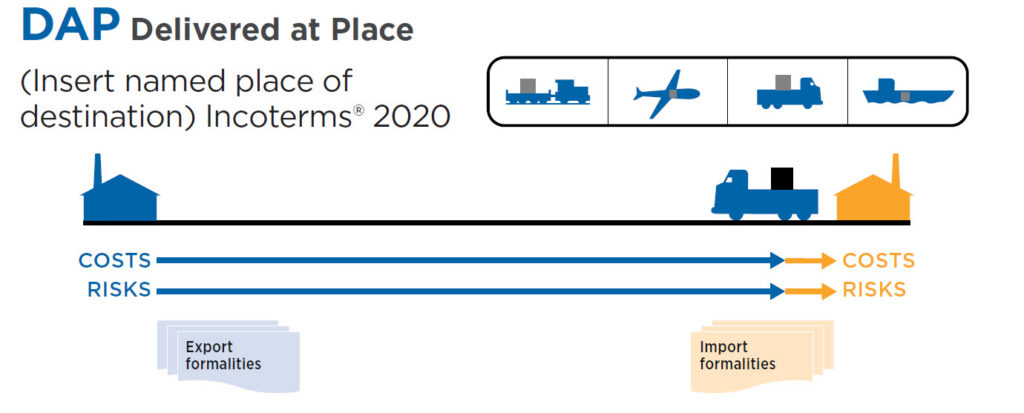
Although it has an obligation to conclude a contract of carriage or arrange at its costs for the carriage of the goods and to clear the goods for export (not import), the seller is not required to unload the goods from the transportation vehicle at the place of destination. In addition, neither the seller, nor the buyer, is required to subscribe an insurance contract.
DPU Incoterm (Delivered at Place Unloaded)
The DPU Incoterm represents a new feature of the 2020 Incoterms which has replaced the DAT Incoterm (Delivered at Terminal) established under the 2010 Incoterms which, in turn, had replaced DEQ Incoterm (Delivered ex Quay) established under the 2000 Incoterms.[16]
According to the DPU Incoterm, the delivery of the goods by the seller to the buyer occurs when the goods are unloaded from the transportation vehicle and put at the disposal of the buyer at the place of destination or at the agreed point within the place of destination, if any. It is the only Incoterm “that requires the seller to unload goods at destination.”[17] Again, the place of delivery and the place of destination are the same under the DPU Incoterm. Therefore, the seller bears the risk until it has unloaded the goods at the place of destination.
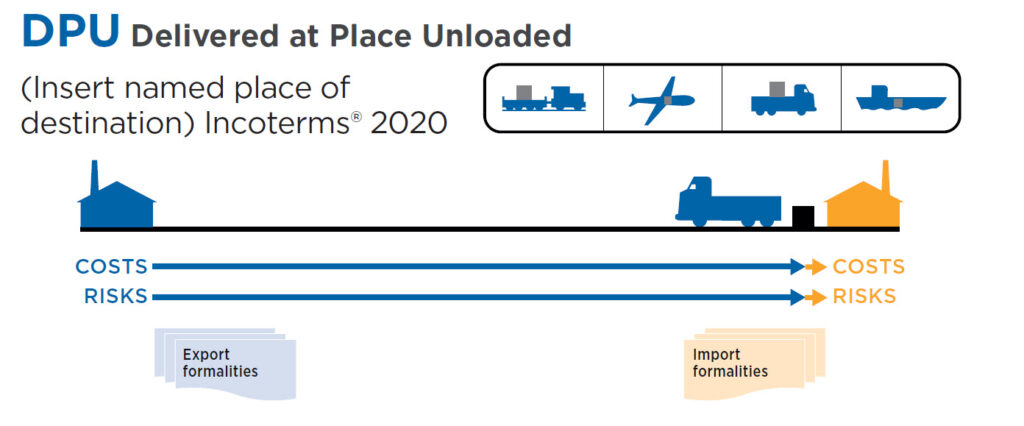
In addition, the seller undertakes to conclude a contract for carriage or arrange carriage at its own expense. It also has an obligation to clear the goods for export. However, no such obligation is imposed for import. The buyer is required to assist the seller in obtaining relevant documentation for export clearance formalities, at the seller’s expenses.
Contrary to the CIP Incoterm, the seller (or the buyer) has no obligation to contract insurance under the DPU Incoterm.
DDP Incoterm (Delivered Duty Paid)
Under the DDP Incoterm, the goods are supposed to be delivered by the seller to the buyer if they are placed at the disposal of the buyer, cleared for import, on the arriving transportation vehicle, ready for unloading at the place of destination or an agreed point within such place, if any.[18] The DDP Incoterm imposes the maximum responsibility on the seller as it is the only Incoterm requiring import clearance by the seller.[19]
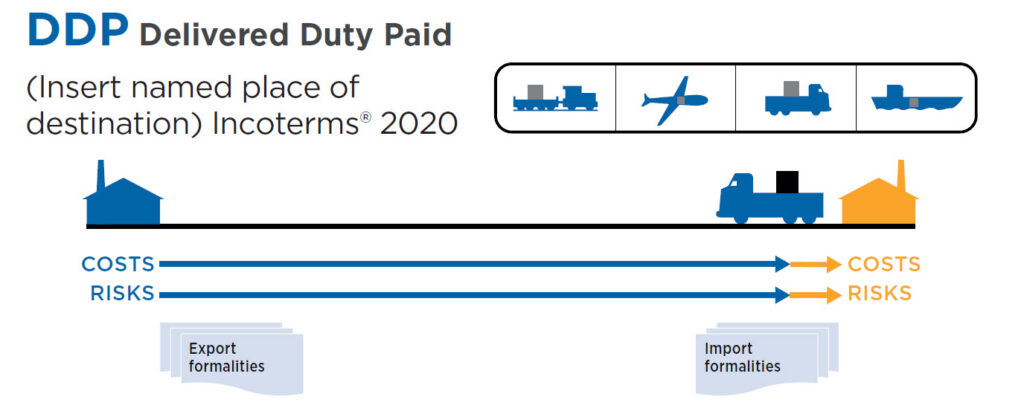
As in the case of the other Incoterms, the DDP Incoterm requires that the seller conclude the contract of carriage or otherwise arrange the carriage at its expense. No insurance contract is, however, required from the seller/the buyer.
Basic Features of Incoterms Used for Sea and Inland Waterway Transport
FAS Incoterm (Free Alongside Ship)
According to the FAS Incoterm, the seller delivers the goods when it either places them alongside the ship/vessel nominated by the buyer at the named port of shipment or it procures the goods so delivered.[20] The risk/damage to the goods is transferred from the seller to the buyer when the goods are alongside the ship. The seller undertakes to clear the goods for export, not import.
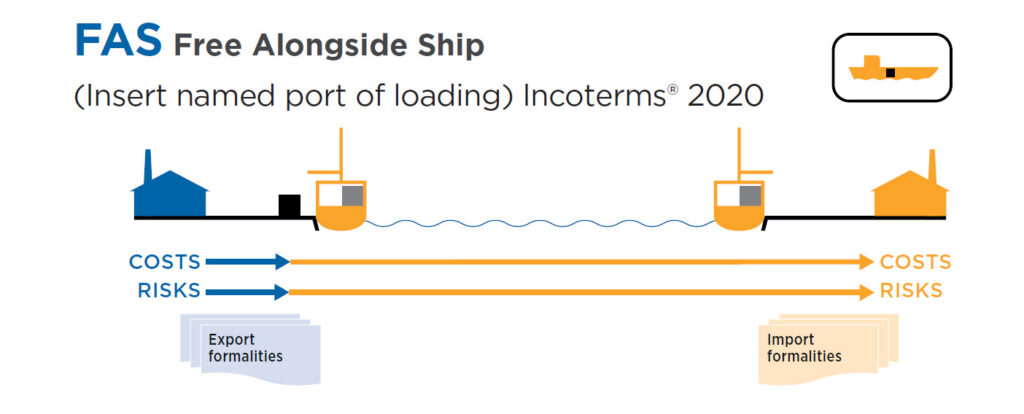
The seller is under no obligation to conclude a contract of carriage. In turn, it is the buyer who bears all expenses regarding the carriage of the goods from the named port of shipment. Consequently, the FAS Incoterm is not suited for cases when the goods are only to be handed over to the carrier, e.g., at a container terminal, before they are placed alongside the ship. For this scenario, the above-mentioned FAS Incoterm is more appropriate.[21]
Furthermore, the seller has an obligation to clear the goods for export (not import). It is not required to conclude any insurance.
FOB Incoterm (Free on Board)
Under the FOB Incoterm, the goods are deemed to be delivered by the seller to the buyer when they are delivered on board the ship nominated by the buyer at the named port of shipment or the seller procures the goods so delivered.[22] Therefore, the risk of loss/damage to the goods is shifted onto the buyer once the goods are placed on board the ship. The seller shall clear the goods for export, not import.
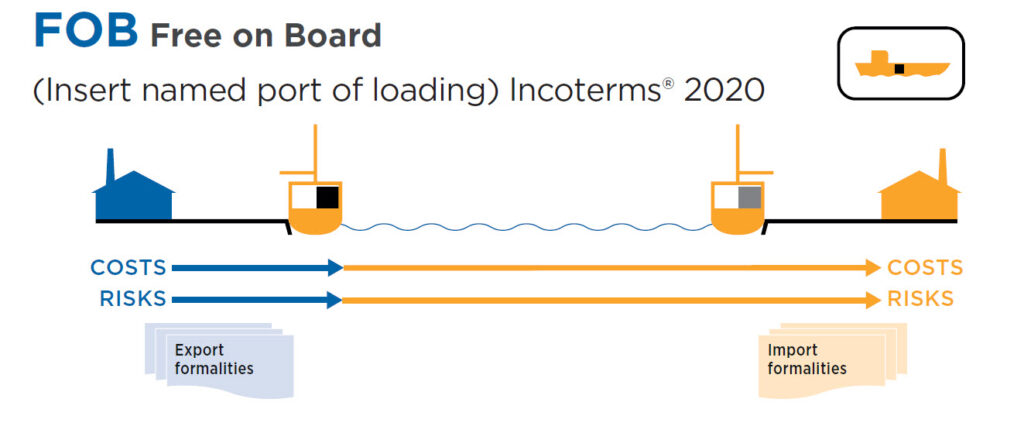
As in the case of the FSA Incoterm, the seller has no obligation to conclude a contract of carriage. All expenses regarding the carriage of the goods from the named port of shipment shall be borne by the buyer.
No insurance is required under the FOB Incoterm to be concluded by the seller or the buyer.
CFR Incoterm (Cost and Freight)
According to the CFR Incoterm, the seller delivers the goods to the buyer by placing them on board the ship or procuring them so delivered.[23] Therefore, the risk of loss of/damage to goods is shifted on the buyer when the goods are place on board of vessel at the port of delivery, and not the port of destination as in the case of the above-referenced FOB Incoterm.
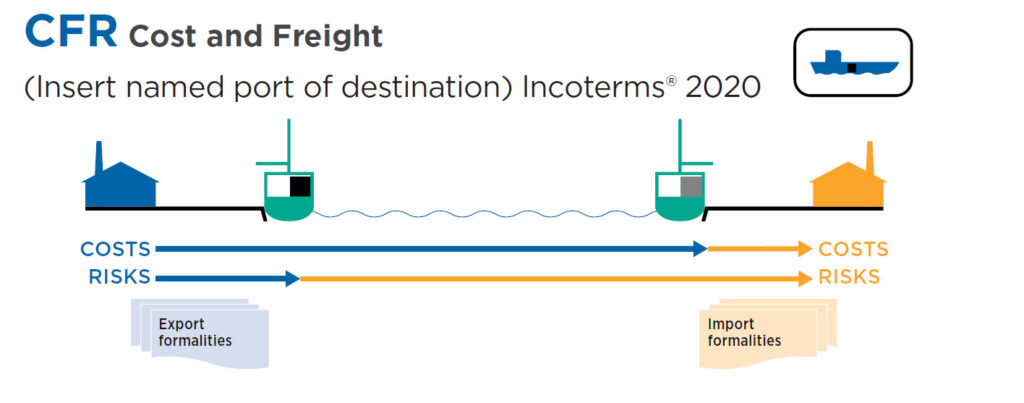
Regardless of the transfer of risk at the port of delivery, the seller has an obligation to conclude a contract of carriage of the goods until the port of destination. The seller also must bear all costs related to unloading at the port of destination resulting from the the contract of carriage, unless agreed otherwise. It also has an obligation to clear the goods for export, not import. No insurance contract is required from the seller or the buyer.
CIF Incoterm (Cost, Insurance and Freight)
The regime of the CIF Incoterm is very similar to the one under the CFR Incoterm:
- the goods are to be delivered under the CIF Incoterm when the seller places them on board the ship or procures them so delivered;[24]
- although the transfer of risk takes place at the port of delivery, the seller has an obligation to conclude a contract of carriage of the goods until the port of destination;
- the seller must bear all costs related to unloading at the port of destination resulting from the the contract of carriage, unless agreed otherwise;
- the seller has an obligation to clear the goods for export, not import.
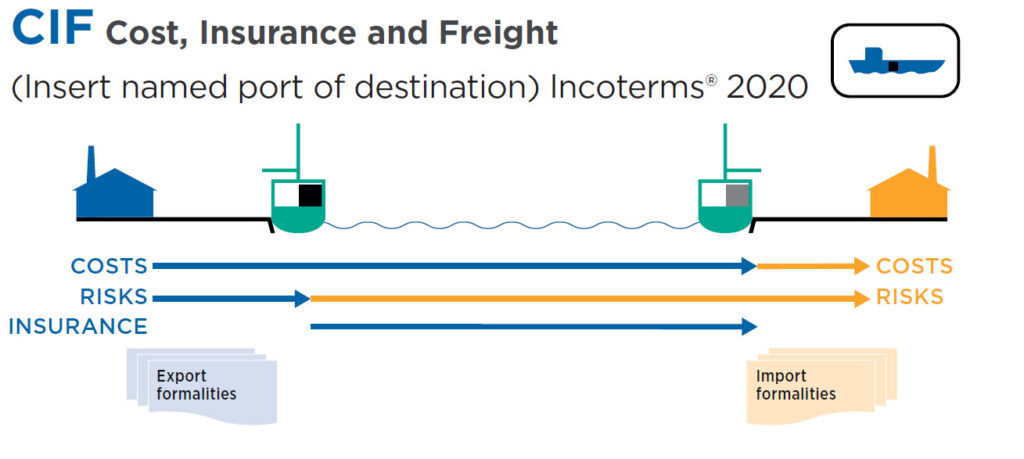
The principal difference between CIF and CFR resides in the requirement under the CIF Incoterm for the seller to conclude insurance covering against the buyer’s risk of loss of/damage to the goods from the port of shipment to, at least, the port of destination. However, contrary to the CIP Incoterm (see above), the seller is required to obtain a minimum insurance according to Clauses (C) of the Institute Cargo Clauses, or other clause (not Clauses (A) of the Institute Cargo Clauses as required for the CIP Incoterm).[25]
Conclusion
The use of Incoterms in international trade is a widespread phenomenon, and disputes frequently arise due to confusion concerning them. Prior to inserting an Incoterm into a contract, it is essential for the parties to make sure that the Incoterm meets all their expectations and needs regarding the following issues:
- Is transport to be made by sea/inland waterway means or not?
- Who should bear the majority of the risk of loss/damage to the goods – the seller or the buyer? At what point in time in the delivery to the place of destination should risk be shifted from the seller onto the buyer?
- Is there a need to use the services of a carrier? If so, who should have an obligation to conclude a contract of carriage – the seller or the buyer?
- Should the seller be responsible for the unloading of the goods?
- Is there a need to subscribe an insurance contract?
[1] J. Coetzee, Incoterms: Development and Legal Nature – A Brief Overview, 13 Stellenbosch Law Review 2002, p. 116.
[2] Incoterms 2020, ICC Rules for the Use of Domestic and International Trade Terms, p. 20.
[3] Incoterms 2020, ICC Rules for the Use of Domestic and International Trade Terms, p. 23.
[4] D. M. Stapleton, V. Pande, D. O’Brien, EXW, FOB or FCA ? Choosing the right Incoterms and why it matters to maritime shippers, 81 Journal of Transportation Law, Logistics & Policy 2014, p. 248. See also G. Gibbons, The Impact of Incoterms 2010, 4 Irish Business Law Quarterly 2012, p. 16.
[5] D. M. Stapleton, V. Pande, D. O’Brien, EXW, FOB or FCA ? Choosing the right Incoterms and why it matters to maritime shippers, 81 Journal of Transportation Law, Logistics & Policy 2014, p. 248.
[6] J. Ramberg, ICC Guide to Incoterms 2010, ICC Publication (2011), pp. 22 and 42.
[7] J. Ramberg, ICC Guide to Incoterms 2010, ICC Publication (2011), pp. 22 and 42.
[8] Incoterms 2020, ICC Rules for the Use of Domestic and International Trade Terms, pp. 27-28.
[9] D. M. Stapleton, V. Pande, D. O’Brien, EXW, FOB or FCA ? Choosing the right Incoterms and why it matters to maritime shippers, 81 Journal of Transportation Law, Logistics & Policy 2014, p. 246.
[10] Incoterms 2020, Free Ebook published by Shiphub, p. 13. See also B. Plitz, Incoterms 2020, 1 Revija Kopaoničke Škole Prirodnog Prava 2020, p. 20.
[11] Incoterms 2020, ICC Rules for the Use of Domestic and International Trade Terms, p. 39.
[12] Incoterms 2020, ICC Rules for the Use of Domestic and International Trade Terms, p. 49.
[13] B. Plitz, Incoterms 2020, 1 Revija Kopaoničke Škole Prirodnog Prava 2020, p. 19.
[14] Incoterms 2020, ICC Rules for the Use of Domestic and International Trade Terms, p. 50. See also Incoterms 2020, Free Ebook published by Shiphub, p. 19.
[15] Incoterms 2020, ICC Rules for the Use of Domestic and International Trade Terms, p. 59.
[16] B. Plitz, Incoterms 2020, 1 Revija Kopaoničke Škole Prirodnog Prava 2020, p. 10.
[17] Incoterms 2020, ICC Rules for the Use of Domestic and International Trade Terms, p. 68.
[18] Incoterms 2020, ICC Rules for the Use of Domestic and International Trade Terms, p. 76.
[19] B. Plitz, Incoterms 2020, 1 Revija Kopaoničke Škole Prirodnog Prava 2020, p. 12.
[20] Incoterms 2020, ICC Rules for the Use of Domestic and International Trade Terms, p. 83.
[21] Incoterms 2020, ICC Rules for the Use of Domestic and International Trade Terms, p. 84.
[22] Incoterms 2020, ICC Rules for the Use of Domestic and International Trade Terms, p. 92.
[23] Incoterms 2020, ICC Rules for the Use of Domestic and International Trade Terms, p. 101.
[24] Incoterms 2020, ICC Rules for the Use of Domestic and International Trade Terms, p. 111.
[25] Incoterms 2020, ICC Rules for the Use of Domestic and International Trade Terms, p. 113.
